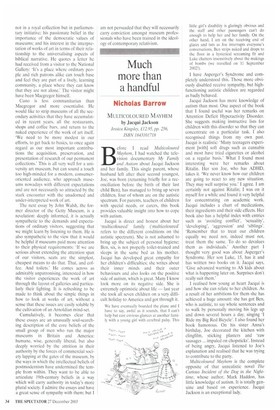Much more than a handful
Nicholas Barrow
MULTICOLOURED MAYHEM by Jacqui Jackson Jessica Kingsley, £12.95, pp. 256, ISBN 1843101718 Be fore I read Multicoloured Mayhem, I had watched the television documentary My Family and Autism about Jacqui Jackson and her family. This single parent, whose husband left after their second youngest, Joe, was born (returning briefly for a reconciliation before the birth of their last child Ben), has managed to bring up seven children, four of whom are on the autistic spectrum. For parents, teachers of children with special needs, or carers, this book provides valuable insight into how to cope with autism.
Jacqui is direct and honest about her 'multicolouredfamily ('multicoloured' refers to the different conditions on the autistic spectrum). She is not ashamed to bring up the subject of personal hygiene; Ben, six, is not properly toilet-trained and sleeps in the same bed as his mother. Jacqui has developed great empathy for her children's difficulties; she writes about their inner minds and their outer behaviours and also looks on the positive side of autism, which is great. Many I know look more on its negative side. She is extremely optimistic about life — last year she took all seven children on a very difficult holiday to America and got through it.
We have eventually hoarded the plane and I have to say, awful as it sounds, that I can't help but cast envious glances at another family with a young girl with cerebral palsy. This little girl's disability is glaringly obvious and the staff and other passengers can't do enough to help her and her family. On the other hand, I am on the receiving end of dares and tuts as Joe interrupts everyone's conversations, Ben strips naked and drops to the floor in a hysterical screaming fit and Luke chatters insensitively about the makings of bombs (we travelled on 11 September 2002!).
I have Asperger's Syndrome and completely understood this. Those more obviously disabled receive sympathy, but highfunctioning autistic children are regarded as badly behaved.
Jacqui Jackson has more knowledge of autism than most. One aspect of the book that I found useful was her remarks on Attention Deficit Hyperactivity Disorder. She suggests making instructive lists for children with this disorder so that they can concentrate on a particular task, I also recognised things from my own past. Jacqui is realistic: 'Many teenagers experiment [with] soft drugs such as cannabis and most have tried cigarettes or alcohol on a regular basis.' What I found most interesting were her remarks about Ritalin. Her son Joe, who has ADHD, takes it. 'We never know how our children are going to react to any new situation. They may well surprise you.' I agree. I am certainly not against Ritalin; I was on it myself for a while and found it very helpful for concentrating on academic work. Jacqui includes a chart of medications, their ingredients and their side effects. Her book also has a helpful index with entries such as 'avoiding conflict', 'sexuality', 'developing', 'aggression' and 'siblings'. 'Remember that to treat our children equally we need not, indeed must not, treat them the same. To do so devalues them as individuals.' Another part I thought very good was about Asperger's Syndrome. Her son Luke, 15, has it and has written two books on it. Jacqui says, 'Give advanced warning to AS kids about what is happening later on. Surprises don't really suit them.'
I realised how young at heart Jacqui is and how she can relate to her children. As a result of her ambitions for them she has achieved a huge amount: she has got Ben, who is autistic, to say whole sentences and to walk by personally moving his legs up and down several hours a day, singing 'I Ride my Big Red Bicycle'. I also found her book humorous. On his sister Anna's birthday, Joe decorated the kitchen with clingfilm, sticking plasters and 'raw sausages ... impaled on chopsticks'. Instead of being angry, Jacqui listened to Joe's explanation and realised that he was trying to contribute to the party.
Multicoloured Mayhem is the complete opposite of that unrealistic novel The Curious Incident of the Dog in the Nighttime, whose author, Mark Haddon, has little knowledge of autism. It is totally genuine and based on experience. Jacqui Jackson is an exceptional lady.


























































 Previous page
Previous page